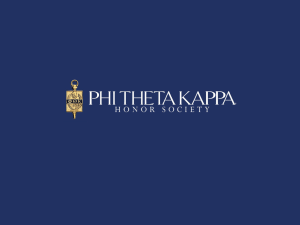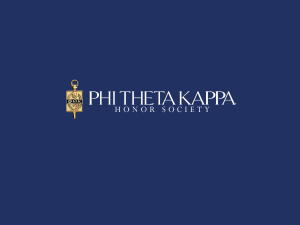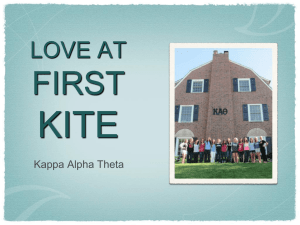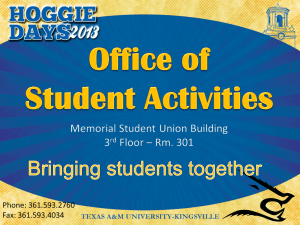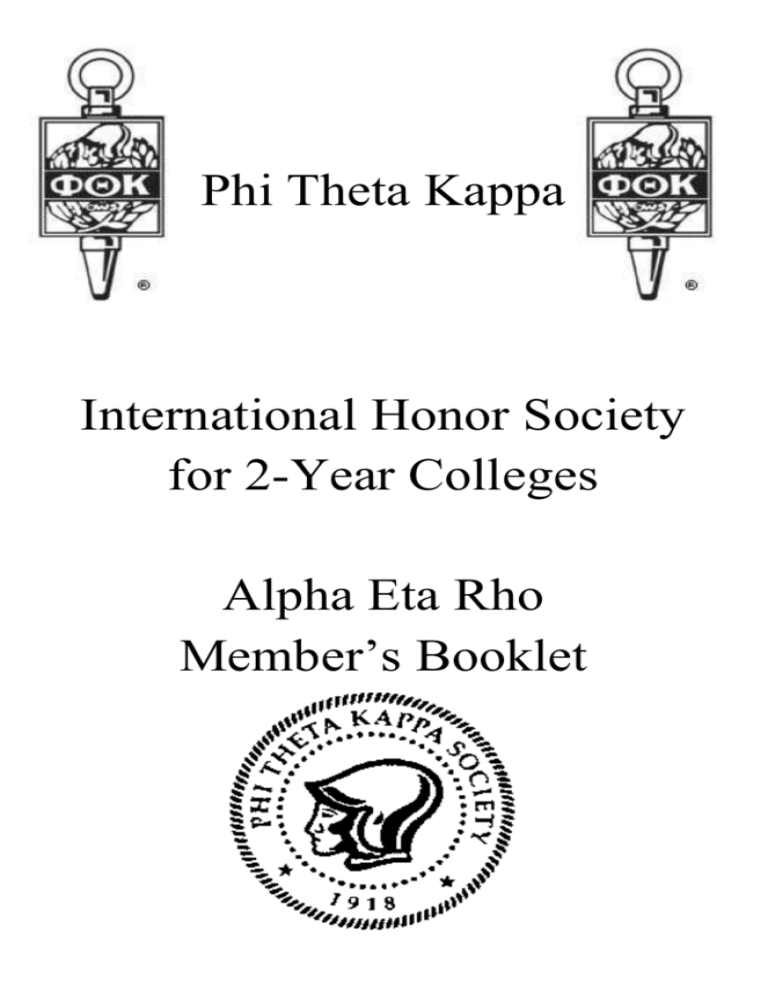
Phi Theta Kappa
International Honor Society
for 2-Year Colleges
Alpha Eta Rho
Member’s Booklet
Table of Contents
What is Phi Theta Kappa? ----------------------------------- Page 3
History of Phi Theta Kappa ----------------------------------- Page 5
History of Our Chapter and Region -------------------------- Page 7
Membership
----------------------------------- Page 10
Officer and Advisor Duties ----------------------------------- Page 15
Our Chapter
------------------------------------ Page 20
Activities
------------------------------------ Page 22
AEROMA Awards
------------------------------------ Page 23
Hallmarks
------------------------------------ Page 24
Other Awards
------------------------------------- Page 27
Copyright © 2011 by Phi Theta Kappa. All rights reserved. None
of the official Phi Theta Kappa logos and emblems may be
reproduced, stored in a retrieval system, or transmitted, in any
form or by any means, electronic, mechanical, photocopying,
recording, or otherwise, without the prior written permission of Phi
Theta Kappa. Phi Theta Kappa has registered the name, logo and
various titles herein with the U.S. Patent Office.
~2~
What is Phi Theta Kappa?
Mission Statement
"The purpose of Phi Theta Kappa shall be to recognize and
encourage scholarship among two-year college students. To
achieve this purpose, Phi Theta Kappa shall provide opportunity
for the development of leadership and service, for an intellectual
climate for exchange of ideas and ideals, for lively fellowship for
scholars, and for stimulation of interest in continuing academic
excellence."
-
Phi Theta Kappa International Website
Phi Theta Kappa Mission
Phi Theta Kappa's mission is two-fold:
1) Recognize and encourage the academic achievement of
two-year college students
2) Provide opportunities for individual growth and
development through participation in honors, leadership,
service and fellowship programming
~3~
PTK Structure
Phi Theta Kappa is structured on three levels:
Local: A student becomes a member of Phi Theta Kappa through
the local chapter at a two-year college.
Regional: The Society has 29 regions; some regions are one state
such as Texas or New York. Others are made up of several states
such as New England (Connecticut, Maine, Massachusetts, New
Hampshire, Rhode Island and Vermont) or Nevada/California. You
can find contact information for your Regional Coordinator and
regional officers as well as upcoming regional meetings at
www.ptk.org/regions/.
International: The Center for Excellence, Phi Theta Kappa’s
International Headquarters, is located in Jackson, Mississippi.
Today Phi Theta Kappa is the largest honor society in American
higher education with more than 2 million members and 1,200
chapters located in all 50 of the United States, U.S. territories,
Canada, Germany, British Virgin Islands and the Pacific Rim.
~4~
History of Phi Theta Kappa
Phi Theta Kappa traces its beginnings to a Society that
originated with six charter members under the name of Kappa Phi
Omicron at Stephens College in Columbia, Missouri, in 1910. The
Society continued to grow and in the spring of 1918 was one of
many honorary groups in Missouri. At a meeting of the presidents
of the Missouri junior colleges for women in 1918, it was decided
to organize a new honorary society, chapters of which would have
a common character, stand, and similarity of organization. The
name Phi Theta Kappa was chosen, and the Society was
incorporated in Missouri as a national organization. Founders
modeled many aspects of the new Society after the prestigious
senior college honorary society, Phi Beta Kappa.
The eight charter colleges of Phi Theta Kappa were Hardin,
Stephens, Christian, Lindenwood, Cottey, Howard Payne, William
Woods, and Central. The alpha chapter was established at Hardin
College but was later moved to Stephens College when Hardin
College became a baccalaureate granting institution. Today, Cottey
~5~
College, Nevada, Missouri, is the only charter college with an
active Phi Theta Kappa chapter.
For the first six years, Phi Theta Kappa confined its activity
to women’s junior colleges, but in 1924 through constitutional
amendment, the field of activity was enlarged to cover all junior
colleges. In 1926, Phi Theta Kappa expanded beyond the borders
of Missouri and into coeducational institutions. The American
Association of Community Colleges recognized Phi Theta Kappa
as the official honor society for two-year colleges in 1929.
In 1930, Margaret James (Mosal) became the first elected
national president of Phi Theta Kappa while attending Whitworth
College in Brookhaven, Mississippi. She became national secretary
in 1935 and moved the records of the organization to her
hometown of Canton. Mosal served as Phi Theta Kappa’s chief
executive for fifty years, retiring as executive director in 1985.
In the early years, Phi Theta Kappa membership was
conferred to students at time of graduation and few programs and
services were offered. The explosive growth of community
colleges in the 1960s led Phi Theta Kappa to expand its mission to
~6~
reflect the nurturing philosophy of the institutions it served.
Students were inducted as freshmen and study programs were
offered.
History of our Chapter and Region
The Alpha Eta Rho Chapter of Phi Theta Kappa was
created at Kirkwood Community College on March 16, 1982. The
chapter was part of the Minn-io-wa-kota Region (Minnesota, Iowa,
Wisconsin, and the Dakotas.)
In April, 1998 advisors from DMACC, Hawkeye, and
Clinton Community College met here at KCC with Rhonda Kekke,
Dean of Arts & Humanities and Kathleen Van Steenhuyse (Dean
of Social Sciences and Career Option Programs) to hammer out a
proposal to have Iowa named an independent Region of the
International Organization of Phi Theta Kappa. The rationale
included the facts that although dues were paid, the awards, all
leadership conferences, and Regional meetings, and the annual
statewide conventions were held in Minnesota, and dominated by
Minnesota chapters. While it was helpful to have had Minnesota’s
tutelage as the Iowa chapters began, Minnesota was too far away
~7~
and too expensive for Iowa chapters to really participate. Our
students were losing opportunities for leadership and scholarships.
As a result of that meeting, the existing Iowa chapters and the
National organization were presented with a proposal to form a
separate Iowa Region.
In fall, 1998, a statewide meeting was held with observers
from the International organization present, and eighteen of the
twenty-two chapters in existence voted to form the new Iowa
Region. The observers were very impressed by the level of support
and the collaboration which took place. There was no turf
protecting or attention-grabbing. They thought Iowa could be a
model for other areas of the country.
An ad hoc Executive Board met through the summer
writing by-laws and resolving thorny problems of representation,
voting, and regional responsibilities. The International observers
who also came to these meetings were again impressed with the
way we wrote the by-laws to enhance participation from all four
quadrants of the state.
~8~
The new region received national approval and was
announced at the International Conference in Anaheim, CA in
1999. Iowa held its first state-wide convention in the spring of
2000, electing an executive board, adopting by-laws, setting
regional goals, presenting awards for hallmarks, membership,
leadership, and outstanding advisors, and encouraging participation
at the national/ international level. Kathleen Van Steenhuyse
served as one of the advisors on the Executive Board. Dr. Regena
Peters of Hawkeye Community College was the Regional
Coordinator for our State.
Results for students are easy to catalogue: opportunities for
leadership experience, for service projects, for scholarships,
Honors Institutes, for scholarships for college, and for recognition
at Iowa Regional Leadership and State Conventions, and even at
the National level. At the first state convention, Kirkwood swept
all but one of the Hallmark Awards and also received three
Advisor Recognition Awards.
VanSteenhuyse believed that Kirkwood had two wonderful
marketing opportunities: to woo academically gifted prospective
~9~
students who want to do more by letting them know that Kirkwood
has 1) challenging courses to offer, taught by an outstanding
faculty; 2) membership in PTK; and 3) the opportunity to work
with our outstanding faculty in the Honors Project. Second, to let
the four-year transfer institutions know about what Kirkwood’s
best and brightest students have to offer. Doing this is good for our
students and it enhances KCC’s own academic reputation while
fulfilling our mission to serve our seven-county community.
Membership
WHY JOIN PHI THETA KAPPA?
Membership recognizes your academic success
●The Phi Theta Kappa Golden Key membership pin
●A Phi Theta Kappa membership certificate and ID card
●Recognition during college induction ceremony
●Notation of membership on your college transcript*
●Recognition by wearing Phi Theta Kappa commencement regalia
during college graduation and other official ceremonies*
~ 10 ~
●Announcement of earned membership on Phi Theta Kappa's
website
●A press release announcing your academic achievement
Membership empowers you with a competitive edge
●$37 million in scholarships for members only
●FREE enrollment in CollegeFish.org, a transfer and college
completion planning tool
●FREE access to Five Star Competitive Edge, a personal and
professional development plan for building marketable skills and an
online portfolio
●FREE access to our Career Resource Center
●Opportunity to be published in Phi Theta Kappa's anthology, Nota
Bene
●Opportunities to develop research and servant leadership skills by
participating in Honors in Action programming in local chapter
●Opportunity to become part of a network of over 2.5 million
fellow scholars and servant leaders on more than 1,270 campuses
worldwide
●Increased pay grade for entry level federal jobs
~ 11 ~
●Personalized letters of recommendation for scholarships
-
From www.ptk.org
Membership Fee
A onetime fee is charged for new members.
Types of Membership
Alpha Eta Rho offers several types of membership for our
members. These membership types are based on the member’s
activity in the organization and can be changed by being more or
less active.
Alpha Membership
Alpha Membership Requirements:
-
2 activities of volunteering must be related to Alpha Eta Rho
-
Attendance at 3 meeting per semester
Active Membership
Active membership requirements:
-
Attendance at a minimum of 3 meeting per semester
~ 12 ~
Non-Active Membership
- Maintenance of GPA requirements
Alpha members may borrow a stole to wear at
Commencement; upon request, they will also receive a letter of
recommendation from a Phi Theta Kappa chapter advisor.
The Non-active member attends the induction ceremony,
but does not necessarily attend meetings or fulfill a service
requirement. Non-active and active members must purchase a stole
for commencement.
Eligibility
To be eligible for membership:
You must be enrolled in a regionally accredited institution
offering an associate degree program
You must have completed at least 12 transferable credit
hours of coursework that may be applied to an associate
degree (part-time students may be eligible)
You must have a cumulative GPA of 3.5 to be a member
and maintain a GPA of 3.3
~ 13 ~
You must adhere to the moral standards of the society
Both part-time and full-time students who have met all of the
academic requirements are invited to become members.
International students are welcome to become members.
They must achieve the required GPA, have accumulated the
number of hours required by the college to designate full-time
status, and possess all rights of citizenship in their native land.
GPA maintenance is key!
If your cumulative GPA drops below 3.3
You have one semester to raise it. You will receive a letter
from the contact advisor encouraging you to raise your
GPA.
If your GPA includes special conditions that may adversely
affect your GPA average, such as a large number of courses
taken on a “Pass-Fail” basis, contact a chapter advisor for
assistance in calculating your GPA for Phi Theta Kappa
purposes.
~ 14 ~
If your cumulative GPA falls below 3.3 for two consecutive
semesters you will be sent a revocation letter removing you
from PTK. You can rejoin if your cumulative GPA goes
back to 3.5.
Officer and Advisor Duties
Advisor Duties
1. Approving chapter activities.
2. Guiding officers regarding Kirkwood and PTK policies.
3. Deciding on institutional matters, in coordination with
administrative advisors and with input from the chapter
officers and active members ( e.g. bylaws, membership
drives, inductions)
4. Deciding on all financial expenditures. All expenses must
be approved in advance by the advisor.
General Officer Duties
1. Planning and getting involved in Hallmark projects.
2. Attending officer and general meetings and taking a
leadership role at these meetings.
3. Working on Hallmark essays.
~ 15 ~
4. Working to keep new members interested and motivated.
5. Attending regional meetings, as well as other chaptersponsored events (ex. Bake sale).
6. Preparing for and participating in induction ceremonies
(informal and formal).
7. Fulfilling particular responsibilities attached to your office
(outlined below).
Officer Descriptions
If you want to be one of the elected people that coordinate
Phi Theta Kappa, now’s your chance. We are looking for
motivated, dependable, and hard-working members who would
like to step up to the next level and become an officer of the Alpha
Eta Rho Chapter.
President
The President is responsible for working with the VicePresident on planning activities for the school year. The President
is also responsible for leading chapter and officer meetings. The
president needs to meet with the advisor regularly to coordinate
activities. Committee assignment: The president oversees all
committees.
~ 16 ~
Vice-President
The Vice-President is responsible for planning the activities
for the school year. In the event the President can’t come to a
meeting or is unreachable, the Vice-President fulfills the
President’s duties. The Vice-President is the liaison with Beta
Lambda Tau (Kirkwood’s Iowa City chapter). Committee
assignment: Honors in Action.
Secretary
The Secretary has the responsibility of sending out e-mails
on a regular basis about upcoming activities and meetings. The
Secretary also takes minutes at the Phi Theta Kappa meetings and
after typing them up submits them to be posted on the chapter
website. Committee assignment: Honors in Action.
Treasurer
The Treasurer handles submitting receipts for
reimbursement for food ordered for the meetings and other things
purchased for the organization. The Treasurer also handles
depositing money earned from activities. The Treasurer will keep a
ledger and give a monthly budget report at meetings. Committee
assignment: Fund-raising.
~ 17 ~
Public Relations
The Public Relations officer creates posters about the
meetings and hangs them up the Wednesday before the meeting.
The P.R. officer also handles the creation and hanging of activity
posters when needed and getting the word out about PTK and its
activities. Committee assignment: Member recruitment and
retention.
Student Leadership Council Representative
The Student Leadership Council Representative is
the officer who attends student council meetings. They then review
the information with the other officers to see if there is anything
that PTK can help with and to be kept in the loop regarding the
student council. Committee assignment: College project.
~ 18 ~
ALL OFFICERS
All the officers participate in the writing of the Honors in
Action report for this chapter. Officers should also participate in
writing other Hallmark essays. Officers are expected to wear their
medals at the meetings and make every effort to attend meetings,
activities, and PTK conferences. Officers need to be able to meet
occasionally to discuss progress and help plan activities. It is also
STRONGLY recommended that the officers attend the regional
and, if enough funds are available, international conventions.
Officer Elect Protocol Procedure
The Officer Elects are to be trained by the existing officers so
that they are ready when they replace the current officers after the
formal induction in the spring. Unless the existing officer is unable
or unwilling to fulfill his/her duties or are not fulfilling their duties,
the new officers are expected to follow the procedure below. This
is to maintain order, consistency, and communication throughout
the organization so no one is trying to perform his/her duties in the
dark, especially if the organization’s money is involved.
~ 19 ~
1. Consult with the current officer you are replacing about
ongoing responsibilities and current projects.
2. Make an appointment to speak with one of the Phi Theta
Kappa Advisors about your new office. They should give
you feedback about the position.
3. Immediately before assuming your new officer duties, have
a final check with the outgoing officer for any last-minute
updates.
4. Begin your new duties.
Our Chapter
Chapter name: Alpha Eta Rho
Chapter Website: www.kirkwood.edu/alphaetarho
International Website: www.ptk.org
Phi Theta Kappa is a student-driven organization; the
officers coordinate the activities of group. If you have questions,
comments, or suggestions, therefore, you should begin by
contacting one of the Alpha Eta Rho student officers.
Other Phi Theta Kappa Information
Alpha Eta Rho is proud to be affiliated with the Iowa
Region of Phi Theta Kappa and with the international Phi Theta
Kappa society headquartered in Jackson, Mississippi.
~ 20 ~
With the support of Kirkwood Community College, its
members, and advisors, Alpha Eta Rho is dedicated to helping each
active member achieve the four Phi Theta Kappa hallmarks:
scholarship, leadership, fellowship, and service. Phi Theta Kappa
is officially recognized by the American Association of
Community Colleges, Washington, D.C., as the academic honor
society for students in two-year colleges.
Administrative Advisors
Dr. Jennifer Bradley, Dean of Arts and Humanities
E-mail: jennifer.bradley@kirkwood.edu
Karla Scriven, Office Coordinator-Arts and Humanities
E-mail: karla.scriven@kirkwood.edu
Chapter Advisors
Tony Arduini
Phone: (319) 398-5899 x5194
E-mail: tony.arduini@kirkwood.edu
Natalia Cherjovsky
Phone (319) 398-5899 x4249
E-mail: natalia.cherjovsky@kirkwood.edu
Sondra Gates
Phone (319) 398-5899 x5840
E-mail: sondra.gates@kirkwood.edu
~ 21 ~
Meetings
Meetings: 1st and 3rd Tuesdays of every month
Room 304 of Benton Hall
(For more info consult the PTK Calendar on our website)
www.kirkwood.edu/alphaetarho
Activities
Our chapter tries to perform a wide variety of activities
every semester. We also want our members’ opinions about what
we could do to improve our college, community, and environment.
If you ever have an idea for an activity, talk to one of the officers
or advisors.
Activities we have done in the past include:
Daffodil Days
Red Cross Blood Drive
JDRF Walk to Cure Diabetes
Theater Bake Sales
Project Graduation
Indian Creek Nature Center Seed Collection
Indian Creek Nature Center Tree Weaving, Digging up
invasive species
~ 22 ~
AEROMA Award
Our Chapter has an award for active members who participate
in chapter activities for any semester.
How do you receive the award?
1) Meet the following requirements
a. Participate in 2 volunteer activities related to the
chapter.
b. Attend a minimum of 3 chapter meetings during the
semester.
2) Have an officer or one of the advisors initial the activity in
which you participated.
3) Turn in the application to the PTK advisors or officers by
the due date.
~ 23 ~
Hallmarks
What are the Hallmarks?
Every year each chapter needs to write a series of essays
detailing what activities they have had in the fields of scholarship,
leadership, and service. These essays are needed to get our
chapter’s 5-star status, which demonstrates how active a chapter
has been during the year. Hallmarks need to be completed through
the 5-star competitive edge.
Honors in Action
“Honors in Action” means that scholars are engaging with their
communities using the Phi Theta Kappa Hallmarks of Scholarship
(defined as Scholarly Inquiry), Leadership, Service, and
Fellowship to seek solutions for the world’s challenges related to
our Honors Study Topic. The Honors Program Guide is a
comprehensive publication on the Honors Study Topic and Honors
in Action. You can download an electronic copy at
www.ptk.org/honors/guide. It includes an Honors in Action
Planning Model which can supplement the following steps:
1. Read the Honors Program Guide and choose one of its 10 issues. Keep
reflective journals, minutes, or notes at each step describing your
exploration of the issue.
~ 24 ~
2. Each issue has a series of study questions. Choose one or more of
these questions as a focus for research.
3. Using this focus on one or several questions, research the issue. Use at
least 8-10 good-quality academic resources: e.g., academic or
professional journal articles, books by academic/professional
experts, and interviews with experts. Continue to keep reflective
journals and notes chronicling your investigation.
4. After researching, develop conclusions regarding the issue and
objectives or goals resulting from these conclusions — what can the
chapter do to make an impact regarding your conclusions?
5. Develop a project plan that includes the chapter’s
(a) objectives and goals
(b) process that will be used for meeting them
(c) leadership roles of individual chapter members
and of the chapter as a group in meeting these
objectives
(d) groups with which the chapter will collaborate
(e) leadership development activities and/or events
for training and preparing the chapter officers and members for their
leadership roles
(f) service or action event(s) for the college/community.
6. Carry out the plan, and evaluate the results and future possibilities.
7. Write about your Honors in Action project — using your journaling —
for the Hallmark Awards.
- From PTK leaders guide
College Project
The College Project is designed to help your chapter gain
administrative support. How? By reaching out to the college
administration to assist them in any project that supports your
college. Phi Theta Kappa has developed a Community College
Completion Corps toolkit that chapters may wish to present to their
college president to implement a College Project related to this
important national initiative. The toolkit can be downloaded at
www.cccompletioncorps.org. If your college president is looking
for additional ideas, you’ll find more suggestions at
www.ptk.org/fivestar
~ 25 ~
1. Consult as a chapter with college administrators about
projects that would help the college. Keep reflective journals,
minutes, or notes during the meeting and through each of
the following steps.
2. As a chapter, collaborating with administrators, choose a project
and develop objectives and goals, a written process and strategies
for carrying it out.
3. As a chapter, collaborating with administrators, complete
the project.
4. As a chapter, collaborating with administrators, evaluate the
results and future possibilities.
5. Write about the College Project — using your journaling —
for the Hallmark Awards.
~ 26 ~
Outstanding Individual Hallmark
In addition to the three fields for Hallmarks, each chapter needs
to nominate an outstanding individual that has shown the true spirit
of Phi Theta Kappa. This person can be an outstanding:
1. Member
2. Officer
3. President
4. Advisor w/ less than 5 yrs experience
5. Advisor w/ more than 5 yrs experience
Other Awards
Rhonda Kekke Wall of Honor
This award is named after Rhonda Kekke, who was instrumental in
the creation of the Iowa Region of Phi Theta Kappa. Each year, it
is given an individual that demonstrates unparalleled service to Phi
Theta Kappa and embodies the principles this organization stands
for. The recipient’s name is engraved on a plaque that hangs in the
Art and Humanities Office.
~ 27 ~
Pinnacle Award
The Pinnacle Award recognizes Phi Theta Kappa chapters
and regions for successfully enhancing their recruitment and
orientation strategies, as measured by the number of new members
reported to Headquarters in a given year.
The Pinnacle Award promotes increased awareness of Phi
Theta Kappa, and is designed to ensure that the benefits of Society
membership are fully understood by all eligible students.
– From www.ptk.org
The Distinguished Administrator Awards
The Distinguished Administrator Awards will be awarded to
community college vice presidents, deans, or leaders other than
college presidents/CEOs serving a community college in an
administrative capacity. Nominees should have served in their
position for at least two years as of the International Convention,
and should have demonstrated during their tenure a strong level of
support for the Society. Awards will be presented at the
International Convention to recipients who choose to attend, but
may also be sent directly to the advisor of the nominating chapter
for presentation during an appropriate occasion. Up to 25
Distinguished Administrator Awards may be presented each year.
A college administrator may receive this award only once.
– From www.ptk.org
The Shirley B. Gordon Awards of Distinction
College presidents and campus CEOs are selected for this award
on the basis of outstanding efforts given toward promoting the
goals of Phi Theta Kappa. Applications cite specific ways the
president has demonstrated support for the chapter and the Society
as a whole. The recipients must agree to attend the Phi Theta
Kappa International Convention. As many as 25 Gordon Awards
may be presented annually. A college president or campus CEO
may receive this award only once.
–From www.ptk.org
~ 28 ~
The Michael Bennett Lifetime Achievement Awards
The Bennett Lifetime Achievement Award will be presented to
college presidents, campus CEOs at two-year or senior institutions,
and state community college directors who have been supportive
of Phi Theta Kappa, and are retiring from their careers. Recipients
are not required to attend the International Convention. Bennett
Awards will be presented at the Convention to recipients who
choose to attend, but the award may also be sent directly to the
advisor of the nominating chapter for presentation during an
appropriate occasion. An unlimited number of these awards may
be given.
-From www.ptk.org
~ 29 ~

